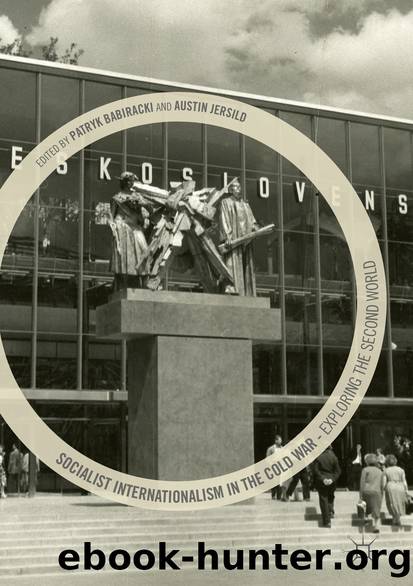Socialist Internationalism in the Cold War by Patryk Babiracki & Austin Jersild

Author:Patryk Babiracki & Austin Jersild
Language: eng
Format: epub
Publisher: Springer International Publishing, Cham
The Second Worldâs Second World War, on Film
Just as telling the story of the Great October, Socialist Revolution became a cultural objective for the Bolsheviks, so too were the efforts to dramatize the Soviet victory in the Great Patriotic War âaccretive and multipleâ in the years thereafter. 45 Cinema provided the perfect form and vehicle for telling the war story. 46 While the reestablishment of Victory Day in 1965 has been identified as a first act in the Brezhnev regimeâs invigoration of the war cult, 47 the cinematic portrayal of stories and battles of the Second World War began long before that date. War films were among the first co-productions with socialist and sympathetic film partners. Negotiating a common story about the Soviet role in winning the war provided national origin narratives for socialist countries within the Bloc 48 while strategically projecting Soviet power to former allies in the cultural Cold War. 49
Early narratives put forward for co-producing war stories derived from the more lyrical aesthetic of Soviet domestically popular and artistic successes like The Cranes are Flying (1957), Fate of a Man (1959), and The Ballad of a Soldier (1959), which crossed socialist and even Cold War boundaries. 50 One such narrative portrayed the moments after the Soviet victory, with Red Army soldiers helping the newly liberated populations. In May Stars (1959), idealized and sentimentalized Czech and Russian encounters after the âliberationâ included Soviet soldiers with a village goose and young lovers meeting by a Soviet tank. 51 The 1960 Soviet-East German co-production, Five Days, Five Nights (Lev Arnshtam and Heinz Thiel), based on real events, featured an exiled German Communist who returns to Dresden with the Red Army and over the next five days aids Soviet soldiers in recovering an art collection of old masters, as local residents gradually come to assist the soldiers. 52 Although this film sold over two million tickets in East Germany, the plotline did not reappear in future co-productions; perhaps the benign image of the Red Army soldier strained credulity from viewers and reviewers when crossing Bloc borders.
Films portraying wartime relationships across national, ethnic, or enemy lines were also made as co-productions. An early example, Gerasimovâs Men and Beasts (1962), co-produced with the GDR, was perhaps too sympathetic to the German soldiers helping the Russian nurse; it quietly disappeared from Soviet screens. 53 Two Soviet co-productions with Poland attempted to dramatize a friendly wartime version of the historically fraught RussianâPolish relationship. In Zosya (1967), a young Russian officer, resting with his unit on a Polish farm, is attracted to a young Polish girl before leaving to fight; in The Legend (1970), a Polish girl cares for two teenage war orphans, a Pole and a Russian. 54 These more intimate war stories, also still available in Soviet domestic war films in the late 1960s through 1970s, 55 were exceptional, however, in the output of co-productions.
Stories with soldiers and comrades in the midst of war dramatized more credible incidents of socialist cooperation on a collective scale.
Download
This site does not store any files on its server. We only index and link to content provided by other sites. Please contact the content providers to delete copyright contents if any and email us, we'll remove relevant links or contents immediately.
| Elections & Political Process | Ideologies & Doctrines |
| International & World Politics | Political Science |
| Public Affairs & Policy | Specific Topics |
| United States |
The Secret History by Donna Tartt(19053)
The Social Justice Warrior Handbook by Lisa De Pasquale(12187)
Thirteen Reasons Why by Jay Asher(8894)
This Is How You Lose Her by Junot Diaz(6877)
Weapons of Math Destruction by Cathy O'Neil(6267)
Zero to One by Peter Thiel(5787)
Beartown by Fredrik Backman(5737)
The Myth of the Strong Leader by Archie Brown(5500)
The Fire Next Time by James Baldwin(5431)
How Democracies Die by Steven Levitsky & Daniel Ziblatt(5216)
Promise Me, Dad by Joe Biden(5142)
Stone's Rules by Roger Stone(5081)
A Higher Loyalty: Truth, Lies, and Leadership by James Comey(4954)
100 Deadly Skills by Clint Emerson(4921)
Rise and Kill First by Ronen Bergman(4780)
Secrecy World by Jake Bernstein(4741)
The David Icke Guide to the Global Conspiracy (and how to end it) by David Icke(4709)
The Farm by Tom Rob Smith(4502)
The Doomsday Machine by Daniel Ellsberg(4484)
